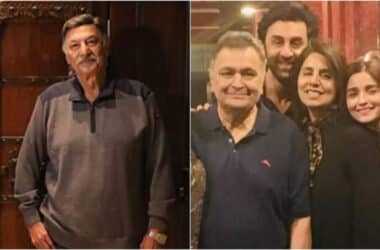[ad_1]
Mark Foster’s return to India after over a decade was nothing short of momentous. The setting? A private, intimate gig at Soho House Mumbai. For Foster (and bandmate Isom Innis), this wasn’t just another stop on a tour; it was a reflective one-day homecoming to a country he last visited during an accidental festival trip in Rajasthan. This time, he brought with him Paradise State of Mind, an album that marks a significant evolution in Foster the People’s sound and philosophy.
Paradise State of Mind channels the vibe of the late ’70s and early ’80s, drawing on Giorgio Moroder’s iconic synth work and the sleek grooves Nile Rodgers is known for—Rodgers even helped Foster get his creative bearings on this album. But this isn’t just a retro tribute; it’s a personal project born from the isolation and soul-searching of the pandemic. Foster described the album as a way to process his thoughts during a time when everything felt especially heavy. The result? Disco-laced tracks like “See You in the Afterlife” that encourage dancing through the dark, balanced with unconventional cuts like “Glitchzig,” where Foster lets his imagination run wild.
The Soho House gig wasn’t just about showcasing new music; it was about creating a space for connection. The intimate setting allowed Foster to engage with fans on a deeper level, something he cherished, especially after years of larger-than-life festival performances. “DJing here feels pure,” Foster reflected, describing the experience of performing in a stripped-down, more personal environment. It was clear this night wasn’t just another gig—it was a shared moment between an artist and an audience.
In our conversation, Foster spoke candidly about the shifts in his life since getting sober in 2018. The album mirrors this journey, exploring themes of hope, joy, and resilience in the face of adversity. Foster’s ability to channel his experiences into music that resonates on both personal and universal levels is a testament to his growth as an artist. And while Paradise State of Mind leans into a more joyful sound, Foster ensures it never slips into escapism. “Real hope,” he explains, “comes from understanding reality and choosing optimism anyway.”
Welcome. When was the last time you were in India?
I was here, I came here I want to say, ten years ago. I started in Delhi and then went to Udaipur. Nice. And Rajasthan. And checked out the palaces. Funny enough, it was accidental. I stumbled upon Krishna’s birthday celebrations—Janmashtami. I saw people climbing and hitting the pot. It was unbelievable. I visited Aurangabad and explored the caves. There’s so much more I need to see. India is such a vast country.
How does performing Soho House Mumbai compare to your usual shows, and what are you looking forward to in today’s set?
It’s a unique experience. We’ve never played live music here, but DJing in India has been amazing. It’s a completely different vibe—much more intimate and personal. You’re in a room, close to the audience, and can feel their reactions directly. It’s pure and mobile, just Isom and me, no tour manager, no big crew. We’ve got a gig stick in our pocket, and we’re connecting with people in a really raw way.
Earlier, Isom and I walked down the beach—it’s his first time in India—and I told him he’d remember this moment forever. It’s special, soaking in the energy of the place. For today’s set, we’re bringing the festival vibe: energetic, heavy future bass, dark and sweaty. We’ve started making electronic music again, and I feel like we’ll be DJing a lot more in the future.
As someone who grew up listening to a ton of disco and funk, Paradise State of Mind really feels like a time machine. Can you share what inspired your latest record and how the pandemic influenced your creative process?
It all started as a deep dive into the late ’70s. I wasn’t sure why I was drawn to that era at first, but as I explored it, I realised it was this incredible melting pot of styles. You had Giorgio Moroder pushing boundaries, Nile Rodgers and Bernie Worrell innovating with synths in Parliament, and a shift from disco to synth-funk that laid the groundwork for artists like Prince. It was a precursor to so many movements—house music, post-punk, electronic sounds from bands like Depeche Mode and New Order. It felt like everything important in music was converging there.
Writing during the pandemic was intense. I was in LA, isolated, and in a dark headspace. The world felt heavy, and I was almost agoraphobic, unsure how to interact with people. On top of that, the climate of censorship and cancel culture was stifling for artists. As a songwriter, being unable to express myself freely was deeply unsettling.
Getting sober in 2018 was a pivotal moment for me. Touring, partying—it all became this Peter Pan existence where I wasn’t growing, just running from things I needed to face. The pandemic amplified that, like being thrown into a crucible, forcing me through a transformative journey. Out of that fire, this record was born. It became a way to process everything—personal growth, sobriety, and the collective darkness we were all living through.
That’s cool though, right? I feel you had to take account of yourself as a person, your journey. How did you handle the changes in the band, especially with Mark Pontius leaving during the pandemic?
That was a really tough period. When we started the band, we were like brothers—best friends navigating the craziness of touring and seeing the world together for the first time. Those high-pressure moments forged us into a tight unit, and we shared experiences that only we could understand. But, as with anything in life, change is inevitable. You have to adapt and evolve, even when it’s hard.
During the pandemic, when Mark Pontius decided to leave, it hit me hard. He was the first guy I called when I started the band. He wasn’t just a bandmate; he was my brother. Every time I walked on stage, I knew he was right behind me, and that gave me this unshakable confidence. Knowing he was there, I felt like everything was going to be okay, no matter what. Losing that presence made me question everything. There was a moment where I seriously wondered if this was it. Should I just hang it up and move on to something else? I sat with those thoughts for a long time.
But as I worked through it, I realised I wasn’t done. My purpose wasn’t over. People may come and go, but the core of who I am—a songwriter, a creator—remains. Even with Torches, I wrote that album alone. Songwriting has always been a personal process for me. The camaraderie on stage, the energy with the band, that’s a different thing. It’s important, but it’s not what drives my creativity.
In the end, I realised I still have more to say, more music to make. This journey isn’t finished, and I’m not ready to walk away from it. Change is tough, but it’s also a chance to rediscover your purpose, and I’m ready to keep moving forward.
They say that every 30-40 years, culture repeats itself—and I think this album is a big example of that.
Meeting Nile Rodgers was a pivotal moment. Before finishing the album, I played him some rough tracks, and we talked about his early days with Chic. He shared how, in the late ’70s, forming Chic mirrored the post-Great Depression and post-World War I era. He drew from music of that time, which was all about joy and unity, despite the challenges people faced. That conversation made me realise why I was making this record.
We’re 45 years on, but we’re still facing economic turmoil and global conflicts. People are scared, and it felt instinctual to create something joyful, but not escapist. I didn’t want pure pop that avoids reality. For me, real hope is grounded in understanding the world’s challenges yet choosing to be optimistic. It’s about bravery in the face of fear, not a naïve pursuit of happiness. That sentiment shaped the entire record.
Was that something that came naturally to you while writing the songs, or was it more intentional? There’s plenty of variety on offer in the tracklist; you’ve gone to a lot of places.
My goal was to be as honest as possible about where I was in my life. I let the songs flow naturally, and by the end, certain themes began to surface. That’s usually how it works for me—I reflect later and realise what the record is about.
For this album, a spiritual through line emerged, touching on the afterlife, time, dimensions, and existential questions about our place in the universe. It’s about living in that space between our perception being everything and nothing at the same time, wrestling with the meaning of it all.
What are the highlights of the album for you, creatively?
One of the biggest highlights for me is Glitchzig. It almost didn’t make the record because I wasn’t sure anyone else would get it or like it. But I stuck with it because I believed in it. Another standout moment is the trumpet solo at the end of the same song. I called my friend Stuart to play, and we talked about the moods of the record—the complexities of life, how it’s playful but can also be really heavy. We wanted to capture that gray area, the blue notes that express those in-between spaces.
Stuart did a few takes, and on the third one, something incredible happened. He just got lost in the music, and when he finished, he was visibly emotional, even crying. This was surprising because he’s usually a very cerebral guy. I realised I couldn’t touch that take—it was perfect as it was. Even the sound of his breathing at the end felt raw and genuine. I built the song around that take, leaving it untouched because it was such a special, emotional performance. It’s moments like that which make the creative process so fulfilling.
Chasing Low Vibrations has that ‘vintage’ FTP sound; something about it reminds me of Pumped Up Kicks. How did that song come together, and what does it represent for you?
Chasing Low Vibrations feels like a confession for me. It’s about owning the darker chapters of my life, especially the period I left behind when I got sober. There are lyrics on this record that scared me to sing, and I knew those were the ones I needed to share. It’s about confronting the parts of myself I might be ashamed of, the uglier sides of my past.
A bit tongue-in-cheek, but; do you ever get tired of being so recognized for one song?
Honestly, not really. *laughs* I feel like the fans who truly know, they get it. Pumped Up Kicks resonated with people in a way that few pop songs do—it’s catchy, but it also tackles a deeply troubling part of American culture. I’m proud to have created something that both rattles people and makes them want to sing along. There’s not a lot of art that can do that.
It’s funny because even with Paradise State of Mind, which is a pretty heavy and introspective record, I felt it was important to stay real. I haven’t come across many songs recently that move me lyrically. But culturally, it seems like people just want to escape and have fun, probably because things feel so heavy right now.
That’s why picking up DJing again feels like a perfect counterbalance. It’s about giving people a space to dance, have fun, and not think too much. Both approaches are important—those who want to dig deeper into the music can, but if someone just wants to enjoy the moment, that’s cool too.
Writing in character can create a bit of a buffer, a degree of separation, but on this album, I wanted to be brave and fully expose those vulnerable aspects. It’s about being honest, even when it’s uncomfortable.
If you could give yourself advice as a musician from 10 years ago, what would it be?
I’d tell myself to enjoy each moment because it goes by so fast. When we started, we were shot out of a cannon—everything happened so quickly, and nothing prepares you for that. Experiencing early success on a major label brings immense pressure, and it’s easy to equate your worth as an artist with metrics like streaming numbers or album sales. The danger is that if you believe the praise, you’ll also believe the criticism when it comes.
Staying grounded is crucial. Fame can really mess with your head. I think about artists like Chapel Rowan, who’s facing that whirlwind of attention now. It’s a cautionary tale—you can’t prepare for everyone wanting a piece of you overnight. Fame can have serious mental health consequences, and it’s something we don’t talk about enough.
I was reflecting on Liam Payne’s story with my wife, the day he passed. Fame can literally shorten your life—it’s intense, and it gets in your head. Liam was so young when One Direction blew up, maybe 16 or 17, and he passed in his early 30s. Your brain isn’t even fully developed until 25, so experiencing that level of intensity can be overwhelming. It makes you question if the best part of your life is already behind you.
It’s essential to evolve, find balance, and find joy in other things. Honestly, there should be therapists dedicated to helping people navigate the psychological toll of fame. It’s something that doesn’t get enough attention but is so necessary for survival in this industry.
With singles dominating the music scene today, what are your thoughts on the relevance of the album format, and songwriting in that way?
I still love albums. When an artist crafts an album with a cohesive sequence and concept, it becomes an experience, like a film you can revisit. There’s something special about listening from start to finish without skipping tracks—it feels complete. Even though singles dominate now, and listeners often pick apart albums to create their own playlists, I still create albums with the vinyl experience in mind.
I think the culture is shifting in interesting ways. Artists like Tyler, The Creator, who hasn’t relied on radio hits, are creating these well-thought-out concept albums. His work is cohesive, and he’s bigger than ever. The same goes for Steve Lacey and Khruangbin. They focus on making meaningful albums, and people really resonate with that. So, while singles are the norm, there’s still a strong appreciation for the album as a full-bodied art form.
I think music’s in a really cool place right now. You’ll always have big pop stars with massive singles and campaigns, but what’s exciting is how many artists are finding their audiences without needing all that. Weird and experimental music is becoming acceptable, even encouraged.
Take Charli XCX, for example. She’s been pushing boundaries for years, and her recent work feels incredibly artistic, yet it’s also become central to pop culture. That’s important because when something like that crosses over, it broadens the palette for listeners, especially younger ones. It becomes a gateway to explore more experimental sounds.
Looking back at the ’60s and ’70s, the most creative artists—like David Bowie, The Beatles, or Talking Heads—were also the most celebrated. They sat at the heart of pop culture, and their creativity was rewarded. I hope we can align culture like that again, where innovation and artistry are celebrated on a mainstream level.
You’ve name-dropped a lot of artists today, but if you had to choose your dream collaboration, who would it be?
That’s a tough one because there are so many. But if I had to pick, I’d be most interested in working with the older generation while they’re still with us. Brian Wilson is my all-time favourite songwriter, so collaborating with him would be a dream. Giorgio Moroder would be another—I’d love to learn about their processes, especially how they worked with limited tools like four-track tape recorders to create masterpieces.
These pioneers defined modern music, and it’s incredible that we’re alive at the same time as them. But time is fleeting, and they won’t be around forever. It’s a rare opportunity to learn from legends like Smokey Robinson, Paul McCartney, and Ringo Starr while we can. I’ve been fortunate to meet some of these icons, and just being in their presence is inspiring. They truly paved the way for everything we know in music today.
What’s in store for you between now and 2025?
I’ve been working on a few projects, including developing a TV show called Spear Phisher—spelled with a PH. We’re turning it into a graphic novel right now. When I get back to the States, I’ll jump into the studio to write more songs, and hopefully release something before we start touring again.
2025 kicks off with a US tour, followed by a trip to South America in March for Lollapalooza and some side shows. It’ll be our third time headlining there. After that, we’ve got festivals lined up for the summer, and we’re hoping to do an Asia tour by the end of the year. I’d love to play in India—this is the perfect time with festival season coming up. We’ve never performed live here, and with the new record, our live shows are more dynamic than ever, thanks to the incredible jazz musicians we’re playing with. It would be amazing to bring that energy to India.
[ad_2]Source link










